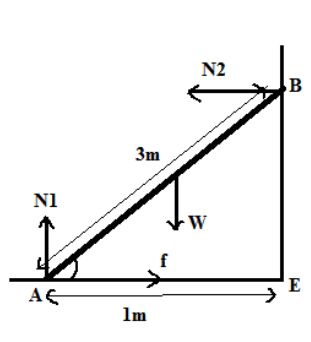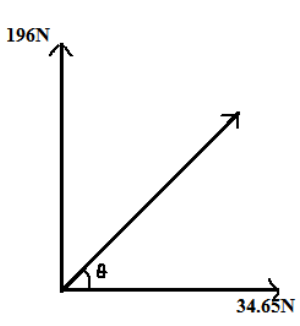Question
Question: A 3m long ladder weighing 20kg leans on a frictionless wall. Its feet rest on the floor 1m from the ...
A 3m long ladder weighing 20kg leans on a frictionless wall. Its feet rest on the floor 1m from the wall as shown, find the reaction forces of the wall and the floor.
Solution
Firstly we will make a free body diagram of the complete system then we resolve the different parameters into its horizontal & vertical component. Then equate them to find the required parameter.
Step by step answer: Given that, Length of ladder AB =3m
Weight of ladder(W) =20kg
Distance of ladder from wall, AE=1m

By making a free body diagram, we can understand in which direction force is acting.
Here N1 and N2are the normal reactions and wis the weight of the ladder.
Now, use Pythagoras theorem,
BE2 = AB2−AC2 =32−12
⇒BE=8 =22
Now, by using rotational equation,
W(1.5Cosθ)=3N2sinθ
Now, substitute all the given values in this equation.
3sinθ20×1.5gCosθ=N2
⇒N2=10g×cotθ
⇒N2=tanθ10g
From the triangle ABE, find the value of
tanθ =ABBE
We know, BE=22 m
AE=1m
So,
tanθ=22
Now, substitute all the values in N2equation,
We get-2210×g=2210×9.8
⇒N2=34.65N
So, value of N2 is =34.65Nwhich is equal to f. so, f=34.65N
We know,
N1=W
⇒N1=20×9.8
⇒N1=196N
Now, one reaction is in vertical direction and one force I acting in horizontal(as shown), so its resultant will be-
R2= (196)2+(34.65)2
⇒R=199N
This R=199N is the resultant of these two(as shown)

Hence, the reaction forces at A and B are 196N and 34.65N respectively.
Note: If we want to find the value of θ then we can substitute the x and y components of forces which are acting here.
So, tanθ=34.65196
tanθ=5.6
θ=80∘
Here normal force is a contact force that requires contact to occur, that surfaces exert to prevent solid objects from passing through each other and reaction force is the force that acts in the opposite direction.
